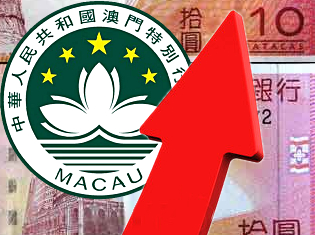 Mass market casino gaming accounted for 27% of Macau’s gross gaming revenue in Q4 2013, according to figures released this past week by Macau’s Gaming Inspection and Coordination Bureau (DICJ). Mass market revenue grew 40% over Q4 2012 while mass revenue for 2013 as a whole rose 35% to MOP 107.84b (US $13.5b). The VIP market also ended the year strongly, with revenue rising 15% in Q4 and up 13% for the year to MOP 238.52b ($29.85b). Slots revenue was up 7% in Q4 and up 9% in 2013 to MOP 14.38b ($1.8b).
Mass market casino gaming accounted for 27% of Macau’s gross gaming revenue in Q4 2013, according to figures released this past week by Macau’s Gaming Inspection and Coordination Bureau (DICJ). Mass market revenue grew 40% over Q4 2012 while mass revenue for 2013 as a whole rose 35% to MOP 107.84b (US $13.5b). The VIP market also ended the year strongly, with revenue rising 15% in Q4 and up 13% for the year to MOP 238.52b ($29.85b). Slots revenue was up 7% in Q4 and up 9% in 2013 to MOP 14.38b ($1.8b).
The continued strength of the VIP market is doubly impressive given the pessimism shown the sector at the start of the year, when operators were on edge, bracing for the expected crackdown on junket operators that never really came. The growing popularity of ‘premium’ mass gaming undoubtedly played a role in the broader mass surge but its impact is hard to quantify, as neither the DICJ nor its licensed casino operators break down their figures into regular and premium segments.
The figures are further scrambled by the fact that the DICJ and its operators don’t always count electronic table game (ETG) revenue the same way, in particular the so-called ‘hybrid’ ETGs, in which a live dealer handles the cards while bets from up to 50 gamblers are collected electronically. The DICJ reports the hybrid ETGs took in MOP 1.49b ($187.5m) last year, up 66% over 2012. But some operators include hybrid revenue along with their slot revenue, while the DICJ lumps in hybrid revenue with traditional live dealer table games.
That works out well for operators, as hybrid ETGs can serve many more gamblers without breaching DICJ-mandated caps on the number of gaming tables each operator is permitted. Not that anyone’s really paying attention to the cap. The DICJ says there were 5,750 tables in operation in 2013, up 4.83% over 2012, well beyond the DICJ-mandated 3% limit on annual table growth. Regardless, Macau officials recently made a stir by suggesting it might establish a new cap on hybrid ETGs to reflect their unique status.
The hybrid phenomenon is also helping muddy the slots figures. While slots revenue was up 9% in 2013, Macau finished the year with 13,106 slot machines in action, well down from the mid-2012 peak of 17,035. Some of the decline is due to operators having to retrofit many machines in order to comply with rewritten regulations, but Union Gaming Research insisted the operator-supplied figures of slots and ETGs in action on their gaming floors “is significantly higher (and growing),” underscoring the confusion over what constitutes electronic gaming in Macau.
